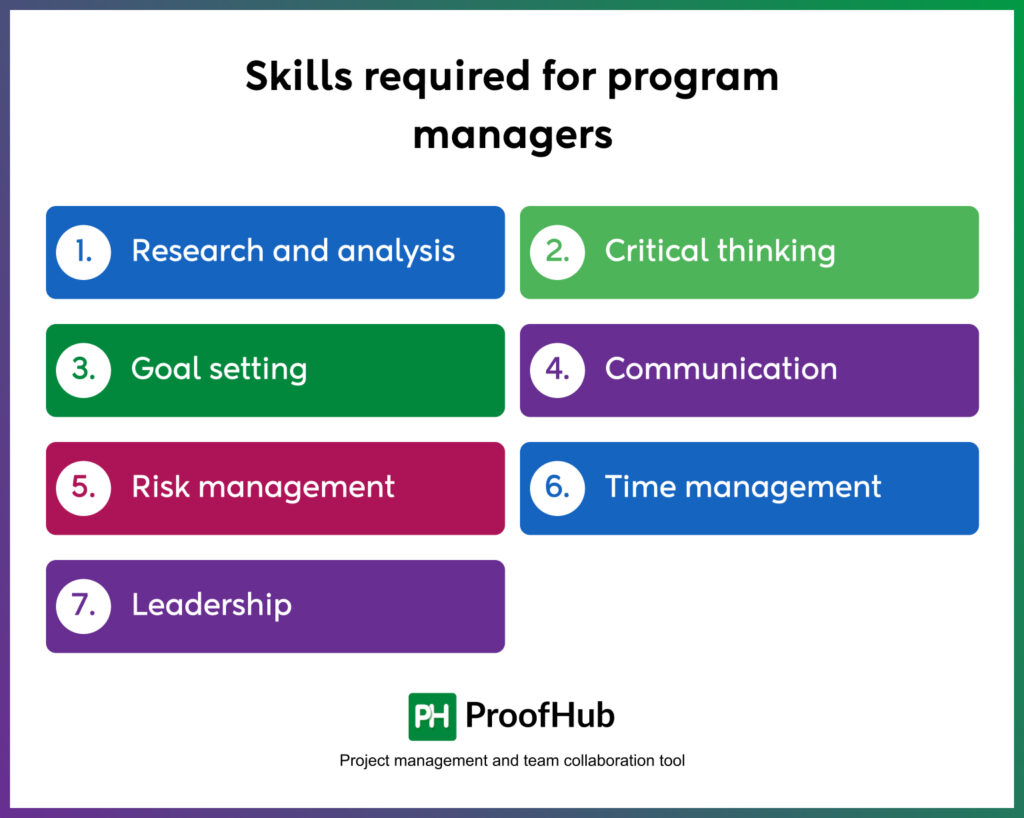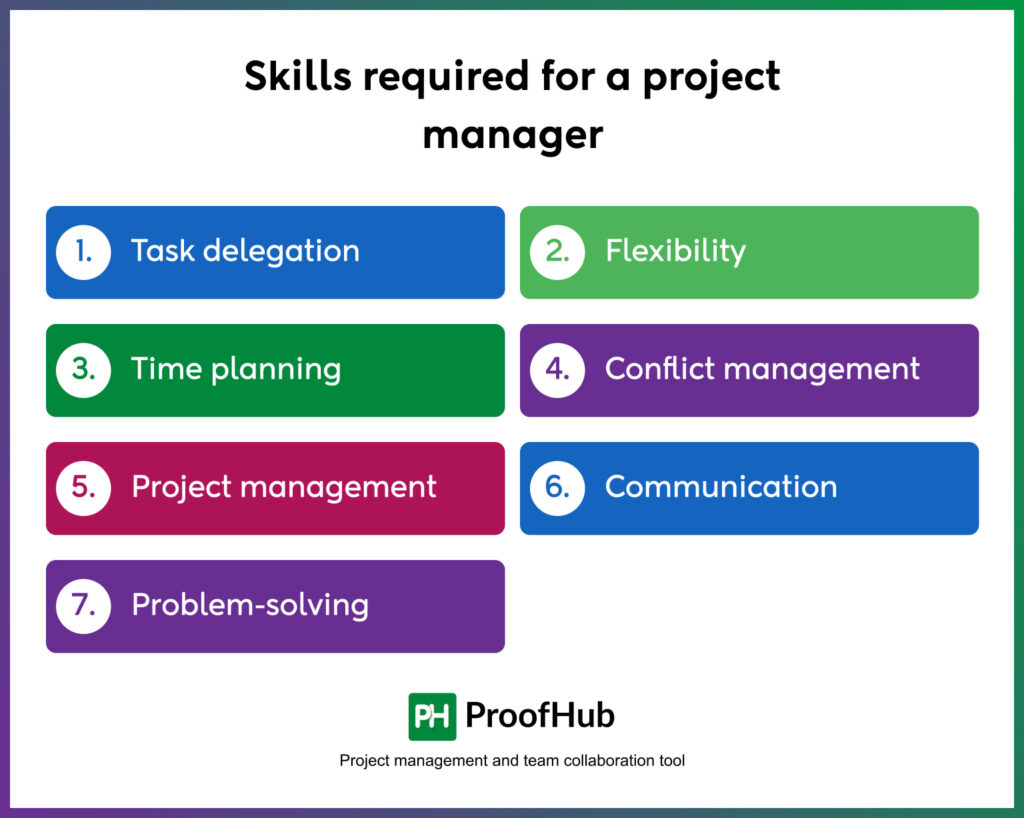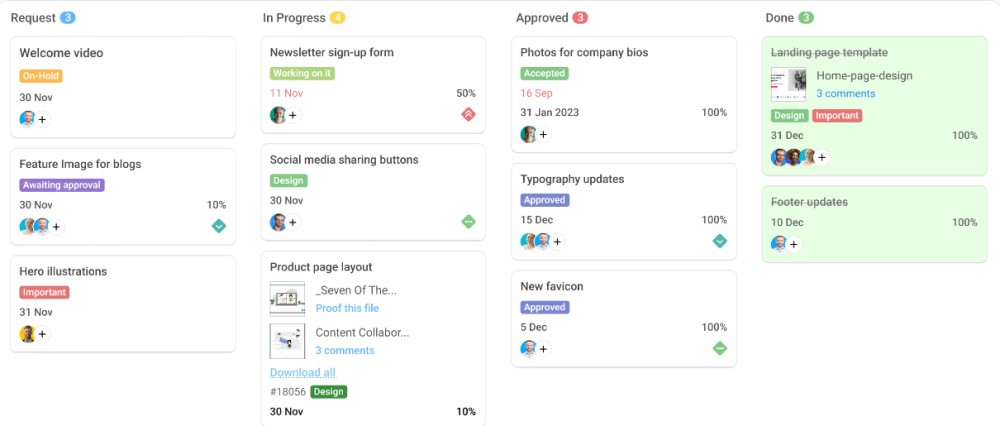Program manager vs. project manager — not able to differentiate the blurred line between the two? Let’s clear it up!
For example, you are constructing a new home. You need to build a house, paint the building, and hire an electrician for electrical fitting, a plumber for plumbing installation, and a carpenter for the woodwork. We clearly understand that a construction project is an accumulation of multiple small projects.
Similar is the case with a program and a project. A program is made up of multiple projects brought together to achieve one larger objective.
The role of a program manager is to oversee a program with multiple projects under it whereas the role of a project manager is to manage an individual project.
In this post, we will dig deep into the “program manager vs. project manager” topic. We will talk about the roles and responsibilities of the two, understand the difference with an example, and also talk about what tools they need to work together effectively in an organization.
What is a project manager?
A project manager is a project management professional who oversees an individual project. The role of a project manager is to take program initiatives and break them down into tasks, define the cost, resources, budget, & time of the project, manage a team to execute the tasks in a project, and report to the program manager on progress.
Read more: What makes a good manager
What is a program manager?
A program manager is a project management professional who oversees a group of projects in a program. The role of a program manager is to create a program that supports strategic business initiatives, guides the team, and facilitates communication among cross-functional teams in a program.
Program manager vs. project manager: The difference between the two
A program manager oversees high-level objectives at the business level whereas a project manager oversees small-level objectives at the project level. Let’s understand the difference between a program manager and a project manager with an example.
Say, you have to lead your company’s marketing campaign program to achieve the long-term organizational objective of generating leads for your B2B SaaS product.
To create an effective marketing campaign, you need to run email marketing, search engine optimization, and social media marketing campaigns.
Each campaign is a project in itself with its dedicated team, strategy, and goals, with the common goal of generating leads for your B2B SaaS product.
The role of the program manager is to oversee all the projects in a program, establish the goals of the program in alignment with larger company objectives, align the project goals with the program goals, and facilitate the communication between project managers working in a program.
On the other hand, a project manager will be responsible for the actual execution of the individual project in a program and delivering the specific deliverables on set due dates.
Difference between a program manager and project manager
| Program Manager | Project Manager |
| 1. Oversee high-level objectives at the business level | 1. Oversee small-level objectives at the project level |
| 2. Create programs to achieve business goals | 2. Create projects to achieve program goals |
| 3. Responsible for long-term objectives | 3. Responsible for short-term deliverables |
| 4. Work is rarely time-bound | 4. Projects have specific start and due dates |
| 5. Focus on strategic initiatives | 5. Focus on tactical initiatives |
| 6. Engage with stakeholders and managers | 6. Handle team and report to the program manager |
Now, I will give you a brief idea about project manager vs program manager responsibilities and we also talk about program vs project manager skills.
Key responsibilities of a program manager
A program manager takes the business initiatives and creates programs to achieve them. This will result in a set of following key responsibilities for a program manager:
- Engaging with C-level executives to create a program that supports business objectives
- Deciding and planning the projects to be included in a program
- Defining and managing the program budget and resources
- Monitoring the progress of the program
- Risk management
- Strategic guidance to project managers
- Managing communication with stakeholders
- Auditing and quality control
- Aligning the project goals with the program goals
- Managing multiple interrelated projects and coordinating their interdependencies
Key skills required for program managers

A program manager needs a certain set of skills to be effective at the role. Have a look at top program manager skills.
- Research and analysis: A program manager needs to make strategic decisions. They need decent research and analysis skills to gain knowledge and make insights out of it.
- Critical and analytical thinking: The role of a program manager is to create a program to fulfill business objectives. They should be able to analyze and evaluate data and think of all possible scenarios.
- Goal setting: A program manager needs to establish goals to achieve results. They should be able to set reasonable and measurable goals, deadlines, and metrics for success.
- Communication: A program manager needs to deal with different people daily. They should have good communication skills to share information with people in an effective way they can understand.
- Risk management: A program manager is responsible for the program’s budget and resource planning. They should have strong risk management skills to identify, mitigate, and manage risks.
- Time management: A program manager has to oversee a group of projects. They should have good time management skills to give attention to each project.
- Leadership: A program manager leads a group of project managers and strategies with stakeholders. They should have good leadership and decision-making skills.
Key responsibilities of a project manager
A project manager works closely with a program manager to break the program initiatives into actionable projects and manage a team to execute project tasks. This will lead to the following set of key responsibilities for a project manager:
- Engage with a program manager to create projects that support program initiatives
- Defining the project cost, time, and resource requirements
- Creating a project plan, executing the plan, and tracking the progress
- Delegating the tasks, coordinating with the team, and handling team collaboration challenges
- Managing project risks, budget, and resources
- Providing tactical guidance to the team
- Ensuring project deliverables are delivered within budget and time
- Maintaining the strategic alignment between the project and program goals
- Reporting the progress to the project manager
- Project quality control and team performance management
Key skills required for a project manager

A project manager needs a certain set of skills to be effective at the role. Have a look at top project manager skills.
- Task delegation: A project manager should be good at delegating. They should be able to evaluate individual strengths and weaknesses and delegate tasks accordingly for the best results.
- Flexibility and adaptability: A project manager may need to make tactical decisions to respond to dynamic challenges in achieving program initiatives. They should be flexible and adaptive to respond to changes.
- Time planning: It is the responsibility of the project manager to deliver the agreed deliverables on strict due dates. They should be good at planning, managing, and meeting project deadlines.
- Conflict management: A project manager should be good at conflict management because when a team works together, conflicts are bound to happen. Project managers should have active listening, negotiation, and decision-making skills for effective conflict management.
- Project management: A project manager should be skilled in project management methodologies to better plan projects, execute the project plan, create workflows, track progress, create project reports, and manage risks, resources, and budgets to achieve business objectives.
You can learn more about the role of a project manager in this video:
- Communication: A project manager needs to communicate with stakeholders, program managers, and team members. They should be good at understanding people and expressing what they want to convey.
- Problem-solving and decision-making: A project manager faces challenges almost every day related to projects, teams, and more. Solving a problem is a part of workplace dynamics and often requires making a decision. A manager should be good at problem-solving, analyzing situations, and making decisions.
Read more: How to become a good manager
Are project manager and program manager roles interrelated?
Project manager and program manager roles are interrelated, but these are two distinctive organizational functions. A program manager works closely with a team of project managers to achieve business objectives.
Can a project manager become a program manager?
Yes, a project manager can become a program manager. After gaining significant experience in the role of project manager, a project manager can be advanced to the role of a program manager. However, you can increase your chances of getting promoted to program manager by obtaining industry-standard certifications for a program manager.
Program and project manager certifications
Experiential learning plays a key role in the life of a program manager and a project manager, but certifications can help lay the foundation. Obtaining industry-leading certifications proves the knowledge, skills, and expertise of program and project managers. Have a look at them.
Program manager certifications
The top three certifications for a program manager include:
1. Program Management Professional (PgMP)® by PMI
PgMP® certification verifies that the certificate holder has the advanced level of expertise and the real-world experience to manage multiple, related projects and navigate complex activities to align results with organizational goals.
2. Certified ScrumMaster® (CSM)® by Scrum Alliance
CSM® certification verifies that a candidate has gained an understanding of the Scrum framework, team accountabilities, events, and artifacts. They know how to guide their team to apply Scrum.
3. Portfolio Management Professional (PfMP)®
PfMP® certification signifies your advanced competency in the coordinated management of one or more portfolios to achieve strategic objectives. Effective portfolio management allows you to implement strategic initiatives by bridging the gap between strategy and implementation.
Project manager certification
The top three certifications for a project manager include:
1. Certified Associate in Project Management (CAPM)®
CAPM® certification verifies that you have foundational knowledge and skills in project management. It evaluates your skills in predictive project management, agile principles, and business analysis.
2. PMP badge Project Management Professional (PMP)®
PMP® certification verifies that a candidate is skilled at managing people, processes, and professional projects. To obtain PMP certification, a project manager must meet certain requirements and then pass a 180-question exam.
3. PMI Agile Certified Practitioner (PMI-ACP)®
PMI-ACP® certification validates that you are highly skilled in understanding and applying multiple agile approaches including Scrum, Lean, Kanban, and Test-Driven Development.
Read more: Top 19 project management certifications to enroll in 2024
Program manager vs project manager salary
Let’s discover the salaries of the two roles:
How much does a program manager make?
According to Glassdoor, the estimated annual salary of a program manager in the United States is $108,158 per year in the United States area, with an average salary of $100,063 per year.
However, the salary varies widely depending on factors like area, certifications, industry, education, experience, and additional skills.
The typical range falls between $84K – $140K/ year.
However, according to Salary.com estimates, the average Program Manager salary in the United States is $148,863 as of January 26, 2024, but the range typically falls between $128,121 and $170,876.
How much does a project manager make?
The estimated annual salary of a project manager is $99,726 per year in the United States area, with an average salary of $92,515 per year.
However, just like a program manager, the salary of a project manager varies widely depending on factors like area, certifications, industry, education, experience, and additional skills.
The typical pay range falls between $77K – $129K/ year.
However, according to Salary.com estimates, the average Project Management Manager salary in the United States is $142,011 as of January 26, 2024, but the range typically falls between $126,866 and $158,680.
Who earns more, the program or the project manager?
In general, a program manager makes more than a project manager. However, the salary depends on the experience, industry, and skills.
Tools that a project manager and a program manager will need
A program manager and a project manager have to manage plenty of tasks in day-to-day life. They need tools to perform tasks efficiently and make work life easy. The top tools a program manager and a project manager need include project management software, communication apps, document management systems, data analysis software, and a to-do list app.
One of the most important tools they need is a project management tool. Studies have also confirmed the same that 77% of high-performing teams use project management tools.
If you are not using any project management software to manage projects at your organization, it would be a great idea to use a tool to manage projects in a more organized and effective way.
You can get started with ProofHub to manage all your projects, teamwork, and team communication from one place.

ProofHub streamlines project management for program and project managers by offering:
- Centralized platform: Manage tasks, discussions, files, and more in one place.
- Visualizations: Track progress with Kanban boards, Gantt charts, and calendars.
- Seamless collaboration: Communicate with team members through discussions, chat, and feedback tools.
- Actionable insights: Gain valuable insights through detailed reports, customizable dashboards, and time tracking.
Overall, ProofHub is an easy-to-use, scalable, and feature-rich tool that helps you improve your productivity, stay on top of work management, and collaborate with the team.
FAQs
Can an individual be both a project manager and a program manager simultaneously?
Yes, in some companies, an individual can perform the role of both a project manager and a program manager based on the complexity of a project, project size, team size, resources, and company requirements.
Who is more senior program manager or project manager?
A program manager is higher in the hierarchy than a project manager. A project manager can become a program manager by adding extra skills to their portfolio and obtaining certificates for program managers.
In terms of decision-making, who holds more authority, a project manager or a program manager?
A program manager holds more authority than a project manager in decision-making as they are responsible for overseeing the higher level of objectives of multiple projects in a program.

